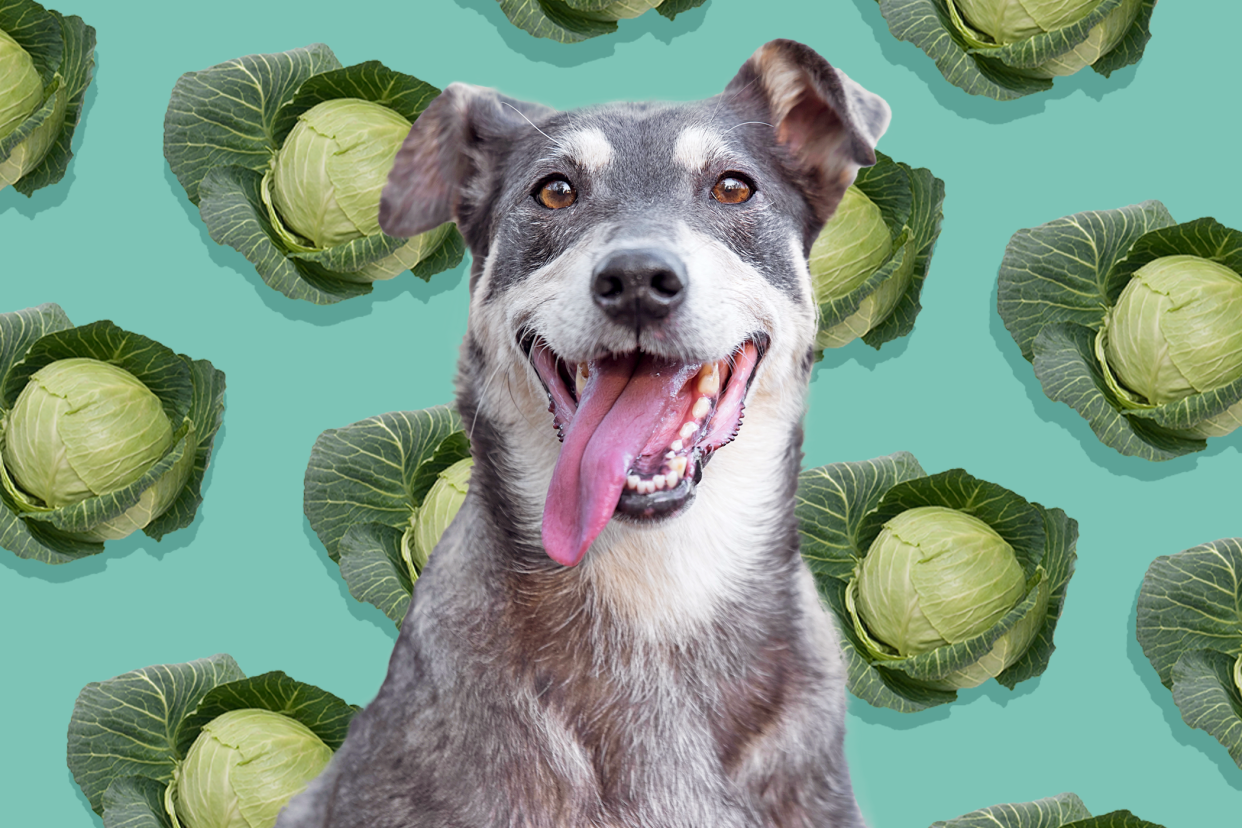Can Dogs Eat Cabbage? Here's What a Veterinarian Recommends

Antonio Busiello / Getty / SasaStock / Adobe Stock
As natural omnivores, dogs are curious about all types of food—especially when it's on your plate, just out of easy muzzle reach. Most brands of dog food contain a well-balanced blend of meat, fruit, and vegetables, all specially formulated for proper nutrition. Your veterinarian might also recommend occasional plant-based treats to tempt your pooch.
But can dogs eat cabbage? More to the point, do they even want to? Probably. (Whatever's on your plate, remember?)
Is Cabbage Good or Bad For Dogs?
Albert Ahn, DVM, is the veterinary advisor for MYOS Pet. He tells Daily Paws that cabbage is good for dogs because like many vegetables, it's packed with a lot of good nutrients, antioxidants, and vitamins.
This crunchy, cruciferous vegetable is in the same family as broccoli and cauliflower (which are also okay for dogs to nibble now and then). It's a low-calorie, high-fiber topper choice, rich in vitamin C, vitamin K, magnesium, and beta-carotene. It can be included along with other greens such as lettuce and spinach in your pup's healthy treat allotment, which vets advise as less than 10 percent of his daily diet.
However, there's a caveat. "Note that cabbage can cause gas production," Ahn says. Fiber and raffinose are the stinky-causing culprits in this case. Raffinose is a form of sugar that can only be digested by gut bacteria through a fermentation process, which produces gas. Some dogs might not be able to tolerate cabbage as a result without a lot of flatulence.
So start with just a tiny bit and, if your dog enjoys it, take note of any smelly side effects. If they appear, a carrot might be a better veggie option!
RELATED: 3 Ways to Prevent Gas and Bloat in Your Dog
Cabbage also contains thiocyanate, a chemical compound that affects the thyroid gland. If your pooch has too much cabbage, there's a risk of developing hypothyroidism. So again: offer a small amount of this green occasionally, and there shouldn't be any major issues.
How to Safely Feed Your Dog Cabbage
"It's best to introduce this wonderful vegetable to a dog when they're in their adult life stage," Ahn says. Since puppies have a different feeding regimen and dietary requirements as they grow, they usually don't advance to adult food—dog or human—until they reach their breed's full height and weight requirements. Your vet can answer any questions about this and help customize an eating plan that includes the proper amount of fruit and vegetable additions, if necessary.
RELATED: Raw Food Diet for Dogs: Good or Bad?
Can dogs eat cabbage raw? While small quantities likely won't harm your dog, cooked cabbage—usually boiled or roasted without any type of seasoning at all—is easier for them to digest. Especially avoid mixing in onions and garlic, which are toxic to dogs. Ahn says cooking the cabbage also helps deactivate the effects of thiocyanate.
"Additionally, it's best to check with your vet first to make sure they're both aware and comfortable with you introducing cooked, diced cabbage into your dog's dietary regimen," he says.
Since cabbage leaves are so dense and leathery, even after cooking, Ahn says they pose a choking hazard and might also make digestion more difficult. So after this veg is cooked, dice it up—once you chop it into 1-inch squares, just run your knife through it again to make pieces even half that size or smaller.
Then, add a sprinkling to your dog's meal as a delicious and diverse food topper. He'll feel special and think it came from your plate! Shhhh, we'll never tell.
Can Dogs Eat All Types of Cabbage? What About Other Fruits and Vegetables?
As long as it's cooked, your dog can have cabbage of all kinds. "Savoy cabbage, red cabbage, Brussels sprouts, and bok choy are all very popular varieties that are fed to dogs," Ahn says. The regular green and Napa cabbage are just fine, too. Out of all of them, the red is likely to be most nutritious, while the green will have the highest water content.
Can your doggo have other plant snacks? Ahn says yes. "Be sure to ask your veterinarian about other vegetables they recommend. There's a veritable cornucopia of healthy vegetables and fruits that you can add for variety."
So if your vet says it's okay, surprise your pup with a smackerel of those we mentioned above and these other safe human nibbles.
Vegetables
Cooked zucchini
Fruits
Melons, such as cantaloupe and watermelon
These are all good choices—in moderation, of course—and give you an opportunity to share just a little of what you eat with your furry best friend. After all, he'd happily give you all his kibble if you'd only ask!

